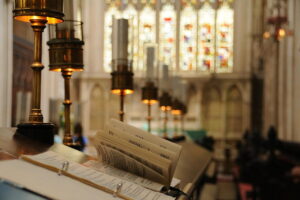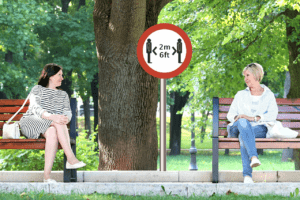Isaiah 58: 7-10 (RM) or 1-9 (RCL); Psalm 112; I Corinthians 2: 1-5 (RM) or 1-12 (RCL); Matthew 5: 13-16 (RM) or 13-20 (RCL). For this Reflection: Matthew 5: 1-12
Jesus had a way of absolutely flooring people. He was already attracting crowds by healing the sick, and now we see him sitting down and teaching for the first time in his public ministry. He started by taking those first four disciples up a mountain, away from a crowd that would have been puzzled, even offended, if they had heard what Jesus was saying. What he had to say was revolutionary.
Blessed are the poor in spirit? Blessed are the meek? That doesn’t make sense. Being poor, in spirit or anything else, is no picnic. Being meek makes you pathetic, and what’s worse, vulnerable. Is this good news? Is this even safe?
It made more sense to me when I saw a note in the commentary by Scripture scholar Werner Weinreich. He compared the attitude Jesus asks us to take on, to the attitude of a horse. The Greek word that Matthew uses for “meek,” praeis, doesn’t mean a weakling or a compliant victim. This word was used of war horses, or horses who pulled chariots, who instantly and quietly obeyed the tug on the reins. There’s nothing weak about a tall, muscular horse. Yet the horse will comply with the rider’s commands when the two are working together, and when the horse knows the human is in charge.
To become a real equestrian you need to begin riding at an early age – like age 2. I started riding lessons at age 69, really, really too late. A mature person will tend to over-think the process. But over several months I was making progress and gaining confidence, until the point when I was trying to learn how to post a trot (moving up and down in the saddle to avoid crashing down on the horse’s back.) At that point I was keeping track of the reins in my hands, my feet in the stirrups, my legs against the horse’s side and my rear end in the saddle all at once, and I was giving the horse confusing commands. Finally my riding instructor shouted, “If you’re not careful you could de-train the horse!” And I was shocked. I didn’t know that an incompetent rider could actually damage the poor horse’s training.
Now, this is how the image of a well-trained horse fits into the Beatitudes. The rider has to be in charge, and the horse has to be able to trust the rider. We’re the horse – strong, swift, noble creatures, capable of so much – but only when we can respond to the direction given by the rider. And that requires attentive awareness.
Let’s look again at the Beatitudes through this lens. “Blessed are the poor in spirit, for theirs is the kingdom of heaven.” We can be blessed/happy/joyful when we can somehow hear the voice of God, or sense God’s presence, but that means we have to get out of the way sometimes – to silence the noise all around us so we can hear.
“Blessed are those who mourn, for they will be comforted.” Even when God seems far away, and the pain and the desolation so near, a space opens up for God to be close to us. We might not have noticed it otherwise – or needed it so much.
“Blessed are the meek.” For they’re not afraid to, uh, let God be in charge?
“Blessed are those who hunger and thirst for righteousness – for justice.” For Matthew’s readers, especially the Pharisees, righteousness meant a way to make oneself perfect, but Matthew goes beyond that. Only Christ, the incarnate God, can make possible all righteousness. But only when Christ is the rider.
“Blessed are the merciful.” The more we can open up spaces of reconciliation, or dialogue, or forgiveness, the more God’s compassion pours into the space.
“Blessed are the pure in heart,” which means, those who are truly sincere and honest. With a sincere heart, we’re less likely to make mistakes by not hearing the voice of the Spirit. We can face mistakes, ask forgiveness, and learn from them. We’re not afraid to let God’s Spirit be in charge.
“Blessed are the peacemakers.” All human peacemaking reflects the Holy One.
“Blessed are you when they persecute you.” For the early Christians, persecution was the highest test of virtue – and one’s own strength was not enough. God’s strength supplied what human strength lacked.
The poor, the needy, those who mourn, are all adjectives for the same people. And they’re all us, in different ways, or different circumstances, at different times in our lives. Jesus lays out a program by which even the least important of people can bring about the in-breaking of the living presence of the Holy One upon the earth. And that’s us too.
Finally, to give due respect to the intelligence of the horse: I was having trouble with Coco, the practice horse, toward the end of the lesson when she’d just go off on her own way and didn’t follow my commands. I thought I was doing something wrong. Finally the instructor told me, “She knows that a riding lesson lasts half an hour in the saddle. She’s heading toward the door of the arena that leads to her stall.” And I had to laugh out of recognition. For years I had served as the chief negotiator and later union president of my local professors’ association. And Coco, bless her heart, was a union horse. She refused to work off the clock.
© Susan K. Roll
Susan Roll retired from the Faculty of Theology at Saint Paul University, Ottawa, in 2018, where she served as Director of the Sophia Research Centre. Her research and publications are centred in the fields of liturgy, sacraments, and feminist theology. She holds a Ph.D. from the Catholic University of Leuven (Louvain), Belgium, and has been involved with international academic societies in liturgy and theology, as well as university chaplaincy, Indigenous ministry and church reform projects.





Love it Susan. Nothing like good old horse sense!
Thank you!